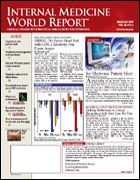Publication
Article
Internal Medicine World Report
Low-Dose Estradiol Gel for Hot Flashes
A fast-drying gel formulation of bioidentical estradiol (Elestrin; Bio Sante) has been approved for the treatment of moderate- to-severe vasomotor symptoms associated with menopause. The gel is placed on the upper arm by a metereddose applicator; it will be available in 2 doses: 0.87 g/day (the lowest estradiol dose approved for this indication) and 1.7 g/day. Adverse effects include breast tenderness and application-site reactions. www.biosantepharma.com
Antidote for Cyanide Poisoning
Cyanokit (hydroxocobalamin for injection; EMD/Merck Sante) has been approved for the treatment of known or suspected cyanide poisoning. The initial adult dose of 5 g can be repeated. Adverse events include temporary pink discoloration of the urine, skin, and mucous membranes; transient increase in blood pressure; headache; nausea; and injection-site reactions. www.emdpharmaceuticals.com
New Schizophrenia Agent
A new molecular entity, paliperidone (Invega; Alza) extended-release tablets, was approved for the treatment of schizophrenia. The recommended dose is 6 mg once daily. Side effects include restlessness and extrapyramidal disorder (eg, involuntary movements, tremors). www.alza.com
New Combo Antihypertensive Expected This Fall
A once-daily tablet that combines the 2 antihypertensives valsartan (Diovan) and amlodipine besylate (Norvasc) will be marketed as Exforge (Novartis) and is expected to be available in September, pending the expiration of market exclusivity and patent protection for amlodipine. Exforge is indicated for patients whose blood pressure is not adequately controlled with a calcium channel blocker or angiotensin receptor blocker or who have dose-limiting side effects with either component. Adverse events reported with the combination include peripheral edema, nasopharyngitis, upper respiratory tract infections, and dizziness. www.novartis.com
First Generic ER Wellbutrin
Bupropion hydrochloride extendedrelease tablets, the first generic version of Wellbutrin XL, have been approved for the treatment of major depressive disorder. Available in 150- and 300-mg strengths, the generic version will be manufactured by Anchen Pharmaceuticals. www.anchen.com
New Indications
? Celecoxib (Celebrex; Pfizer), the only COX-2 inhibitor still on the market, has received a new indication for juvenile arthritis in patients aged ≥2 years. www.pfizer.com
? Exenatide (Byetta; Amylin) is now indicated as add-on therapy to improve blood glucose control in patients with type 2 diabetes who have not achieved adequate control with a thiazolidinedione, alone or combined with metformin (Glucophage). www.amylin.com
? Balsalazide disodium (Colazal; Salix) has received a new indication for the treatment of mildly-to-moderately active ulcerative colitis in patients aged 5 to 17 years. www.salix.com
FDA Proposes New Calcium/ Vitamin D Labeling
The FDA is considering a proposal that would allow the manufacturers of foods and dietary supplements that contain calcium and vitamin D to claim that consuming both products may reduce the risk for osteoporosis. The proposed rule would also eliminate some of the required labeling information, including references to gender, age, and race, since evidence now shows benefits regardless of any of these demographic factors. Comments can be submitted electronically to: www.accessdata.fda.gov/scripts/oc/dockets/comments/commentdocket.cfm?AGENCY=FDA
Labeling Changes for OTC Pain Relievers
An FDA proposal would amend the labeling regulations on over-the-counter (OTC) systemic analgesic, antipyretic, and antirheumatic drugs. For nonsteroidal antiinflammatory drugs, the label would include a warning about potential stomach bleeding in certain populations (eg, aged >60 years, ulcer history). Labeling for acetaminophen would highlight the potential for liver damage in high doses, and when combined with another acetaminophen- containing drug or with moderate alcohol consumption. www.fda.gov/ohrms/dockets/ac/cder02.htm#NonprescriptionDrugs
Rituximab Linked to Deaths
The FDA has issued a warning to physicians after reports of 2 patients who died when being treated with rituximab (Rituxan, Biogen Idec/ Genentech) for systemic lupus erythematous (SLE). The cause of death in both patients was progressive multifocal leukoencephalopathy, a viral brain infection caused by reactivated JC virus. Rituximab is used off-label for SLE. Patients treated with rituximab who develop new neurologic signs or symptoms should be evaluated for progressive multifocal leukoencephalopathy. www.fda.gov/medwatch/safety/2006/safety06.htm#Rituxan






